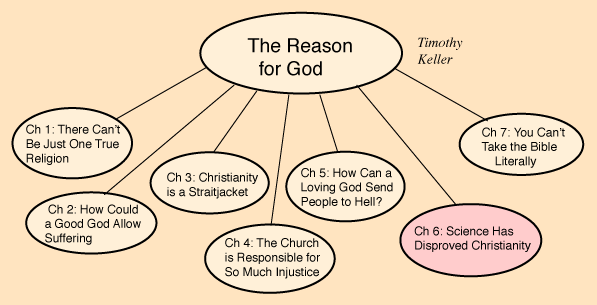The Reason for God
Timothy Keller
Chapter 6: Science Has Disproved Christianity.

Doubt: Miracles are typically at the heart of this objection.
But it is one thing to say that science is only equipped to test for natural causes and quite another to say that science proves other causes don’t exist!
- Put another way, there is no experiment for testing the statement “No supernatural cause for any natural phenomenon is possible.”
- If there is a Creator God, there is nothing illogical about miracles!
There are multiple models of the relationship between science and religion.
- Conflict, dialogue, integration and independence.
- The absolute warfare model arose from a cultural strategy rather than intellectual necessity.
- Multiple surveys exist that pretend to tell us the extent of overlap between religious belief and scientific knowledge or occupation.
- Many are flawed – lumping, for example, those with deistic beliefs with unbelievers.
- Almost all assume that unbelief is a product of the respondent’s science – but Alister McGrath notes that most unbelieving scientists in his experience brought their assumptions about God to their science and did not derive them from it.
- Perhaps the best we can say is that a majority of scientists consider themselves moderately or deeply religious – and this percentage has increased in recent decades (Stark, For the Glory of God pp 192-197)
Perhaps the best we can say is that there is no insurmountable disjunction between science and religious belief.
But What About Evolution?
- Today the conflict with science issue centers principally on evolution.
- There are many Christians (the Catholic Church, for one) who believe God could have used natural processes to produce life.
- But this does not entail “philosophical naturalism,” that everything has a natural cause and that organic life is SOLELY the product of random forces.
- And when evolution turns into a Theory of Everything, we have definitely left the scientific establishment for the philosophical.
- And the debate turns inevitably to scripture, in this case Genesis 1.
- Correct Biblical interpretation has always required a text be understood according to its literary genre.
- The problem arises in those cases there the genre is unclear.
- Correct Biblical interpretation has always required a text be understood according to its literary genre.
- More importantly, anyone considering Christianity should not be distracted by what is essentially an intramural debate.
The Intramural DebateDespite widespread impressions to the contrary, both inside and outside of the church, modern Creation Science was not the traditional response of conservative and evangelical Protestants in the nineteenth century when Darwin's theory first became known. There was widespread acceptance of the fact that Genesis 1 may have been speaking of long ages rather than literal days. R.A. Torrey, the fundamentalist editor of The Fundamentals (published from 1910-1915, which gave definition to the term “fundamentalist”), said that it was possible “to believe thoroughly in the infallibility of the Bible and still be an evolutionist of a certain type” (quoted in Mark Noll, Evangelical American Christianity: An Introduction [Blackwells, 2001],p. 171). The man who defined the doctrine of Biblical inerrancy, B. B. Warfield of Princeton (d. 1921) believed that God may have used something like evolution to bring about life-forms. The best account of the rise of modern Creation Science is by Ronald L. Numbers, The Creationists: the Evolution of Scientific Creationism (Knopf, 1992). See also Mark Noll, The Scandal of the Evangelical Mind (Eerdmans, 1994), “Thinking About Science,” and Mark Noll and David Livingstone, B. B. Warfield on Evolution, Scripture, and Science (Baker, 2000). [Footnote 18, Keller] |
So What Lesson Do We Take From Miracles?
- Note that even the Apostles doubted in the presence of miracles – in this case the risen Christ. (Matt 28:17)
- This is a warning that not only modern, scientific people can struggle with miracles.
- Note also that Jesus used miracles not to suspend the natural order, but to enhance and restore it.
- Think about physical and psychological healing.
- Think about resurrection – not only His own but Lazarus and others.
- Feeding the five thousand, and turning water to wine.
- Miracles seen that way are not a challenge to our minds, but a promise to our hearts.
- In the restored earth, everything will be made new.
| Quotes and comments |
| Reading Reference |
| Software Reference | R Nave |